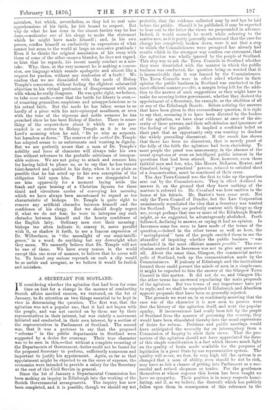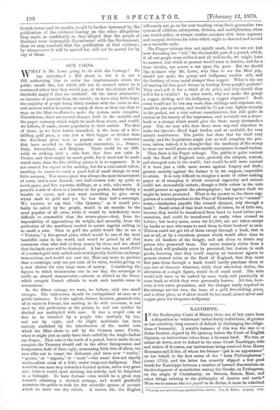A SECRETARY FOR SCOTLAND.
IN considering whether the agitation that had been for some time on foot for a change in the manner of conducting Scotch affairs merited success, we ventured, on the 1st of January, to fix attention on two things essential to be kept in view in determining the question. The first was, that the agitation was not a popular one, that it had not begun with the people, and was not carried on by them nor by their representatives in their interest, but was strictly a movement initiated and conducted, in their own interest, by a section of the representatives in Parliament of Scotland. The second was, that it was a pretence to say that the proposed " reforms " in the public departments in Scotland were suggested by a desire for economy. Their true character was to be seen in this,—that without a complete recasting of the Departments of Government, duties could not be found for the proposed Secretary to perform, sufficiently numerous and important to justify his appointment. Again, so far as that appointment might be objected to on the score of expense, the economies were intended to provide a salary for the Secretary at the cost of the Civil Service in general.
Since the let of January a Departmental Commission has been making an inquiry in Edinburgh into the working of the Scotch Governmental arrangements. The inquiry has now been completed, and it is possible, though we should say not
probable, that the evidence collected may by and bye be laid before the public. Should it be published, it may be expected to bear out to the letter the views we propounded in advance. Indeed, it would scarcely be worth while referring to the matter now, as it is pretty generally understood that the case for change has completely broken down, were it not that a step to which the Commissioners were prompted has already had results which in the strongest way confirm our statement, that• the agitation was wholly ignored by the people of Scotland. This step was to ask the Town Councils in Scotland whether they were dissatisfied with the manner in which the public business was conducted, the question being so worded that it is inconceivable that it was framed by the Commissioners. The Town Councils were in effect asked whether in their opinion the public business in Scotland was conducted in the most efficient mannerpossibk, a margin being left for the addi- tion to the answer of such suggestions as they might have to make for securing better government, whether they desired the appointment of a Secretary, for example, or the abolition of all or any of the Edinburgh Boards. Before noticing the answers that have been given to this extraordinary question, it is right to say that, assuming it to have been dictated by the leaders of the agitation, we have clear evidence at once of the sin- cerity of these persons, and their self-delusion and ignorance of the feeling of the public. It implied a confident belief on their part that an opportunity only was wanting to disclose the widely prevailing discontent. If the result has shown that there has been no discontent, that is merely proof of the folly of the faith the agitators had been cherishing. To most people the proof was unnecessary, in the absence of the usual symptoms of even an intelligent public interest in the questions that had been stirred. Now, however, even those faithful men and few, who, like Messrs. McLaren, Baxter, and Craufurd, being " practical " persons, refused to satisfied short of a demonstration, must be convinced of their error.
The Ayr Town Council was the first to take up the question sent out by the Commissioners. They in effect declined to answer it, on the ground that they knew nothing of the matters it referred to. Mr. Craufurd was here smitten in the house of his friends. Mr. Baxter's turn came next. Not only the Town Council of Dundee, but the Law Corporation unanimously repudiated the idea that a Secretary was wanted for Scotland. They are perfectly content with things as they are, except perhaps that one or more of the Edinburgh Boards might, as we suggested, be advantageously abolished. Perth followed, declining to answer, or saying it had no opinion. In Inverness some fun seem to have made of the terms of the question,—indeed in the other towns as well as here, the " metaphysical " turn of the people enabled them to see the absurdity of inquiring whether the public business " was conducted in the most efficient manner possible." The con- clusion arrived at in Inverness was not to give any answer at all. About the same time, Glasgow, the commercial metro- polis of Scotland, took up the communication made by the Commissioners. If jealousy of Edinburgh and the institutions located there could pervert the minds of men in a simple case, it might be expected to bias the answer of the Glasgow Town Council in this matter. It did not do so, and Glasgow like the other towns has answered repudiating the main proposals of the agitators. But two towns of any importance have yet to reply, and we shall be surprised if Edinburgh and Aberdeen approve proposals that have been so generally rejected.
The grounds we went on, in so confidently asserting that the case was of the character it is now seen to possess were first the history of the agitation itself, and next the popular apathy. If inconvenience had really been felt by the people of Scotland from the manner of governing the country, they would have been stimulated thereby into the usual expressions of desire for reform. Petitions and public meetings would have anticipated the necessity for an interrogatory from a Commission of Inquiry to elicit their views. That the pro- moters of the agitation should not have appreciated the force of this simple consideration is a fact which throws much light on the quality of brain made available for the purposes of legislation in a great State by our representative system. The quality will never, we fear, be very high till tho system is so changed that a man of ability, even should be not be rich, may have as fair a chance of getting into Parliament as a suc- cessful and retired shopman or trader. For the gentlemen themselves at whose expense this lesson has been taught we have no sympathy. Their position is in many respects humi- liating, and if, as we believe, the discredit which has publicly fallen upon them in consequence of this reference to the Scotch towns and its results, would be farther increased by the publication of the evidence bearing on the other allegations they made, as confidently as they alleged that the people of Scotland were thoroughly discontented with the Government, then we may conclude that the publication of that evidence, by whomsoever it will be moved for, will not be moved for by any of them.



































 Previous page
Previous page